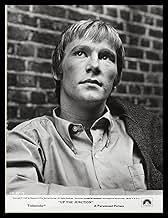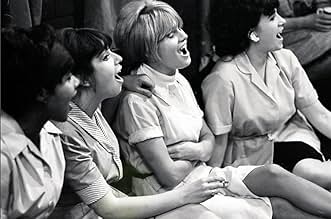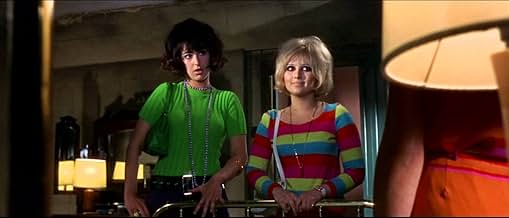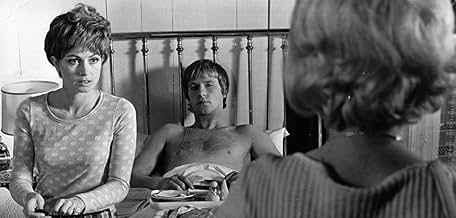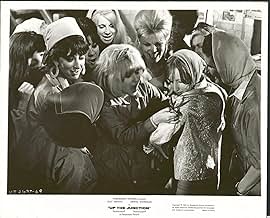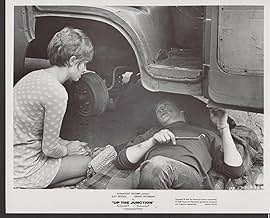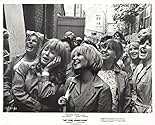IMDb RATING
6.9/10
1.1K
YOUR RATING
Addresses some of the major 60s social issues - a bored rich London-girl from Chelsea decides to go "slumming" in depressed Battersea, getting a flat and starts factory-work and makes friend... Read allAddresses some of the major 60s social issues - a bored rich London-girl from Chelsea decides to go "slumming" in depressed Battersea, getting a flat and starts factory-work and makes friends... of which one has to get an illegal abortion.Addresses some of the major 60s social issues - a bored rich London-girl from Chelsea decides to go "slumming" in depressed Battersea, getting a flat and starts factory-work and makes friends... of which one has to get an illegal abortion.
- Awards
- 1 nomination total
- Director
- Writers
- All cast & crew
- Production, box office & more at IMDbPro
Featured reviews
This movie had a profound effect on me when I first craned my neck to see it from the front row of the Haymarket cinema in Newcastle upon Tyne. I was sixteen years old and on date with a guy that had a rich father, a triumph spitfire and the personality of deadwood. I fell deeply in love with Suzy Kendall knowing that it should have been Dennis Waterman. I saw this movie every night for two weeks. It captures those times exquisitely, almost painfully. I just need to hear the opening theme to be transported back. The clash of cultures, the poverty on both sides of the class divide. Polly had money but was surrounded by shallowness and snobbery. Her friends up the junction had loyalty, camaraderie and fun, but struggled to survive, scamming their way from pay day to pub, who was the poorer? Manfred Mann's excellent score insinuates it's way into the fabric of the movie, haunting and evocative. Give this one a chance, you won't regret it.
Up The Junction was made during the Summer of 1967 though there isn't much love & peace to be found in this film. Arguably the only likeable characters are Polly, an uptown girl who's trying to slum it in Battersea, and Pete (Dennis Waterman) the 'bit of rough' she falls for, and they're not without flaws. I always loved Dennis Waterman in Minder and his character in this film could easily pass for a young Terry McCann; anyone who doubts his ability as a straight actor should watch the showdown between Pete and Polly in the hotel room. The two sisters Sylvie and Rube are sweet & bubbly on the outside but later on reveal a nasty side, especially when mocking a work colleague who appears to have learning difficulties.
Apart from Pete, all the men are depicted as selfish, sex mad and prone to violence.
Up The Junction came out a few years after the golden age of kitchen sink drama, and maybe lacks their gritty Northern humour, but there's still plenty to recommend including some lovely, sweeping London skylines, nice views of the iconic Battersea power station, and a groovy soundtrack by Manfred Mann. Anyone nostalgic for the late 1960s will probably enjoy it.
Apart from Pete, all the men are depicted as selfish, sex mad and prone to violence.
Up The Junction came out a few years after the golden age of kitchen sink drama, and maybe lacks their gritty Northern humour, but there's still plenty to recommend including some lovely, sweeping London skylines, nice views of the iconic Battersea power station, and a groovy soundtrack by Manfred Mann. Anyone nostalgic for the late 1960s will probably enjoy it.
Peter Collinson was already mellowing after his directorial debut with the incredibly nasty home invasion film 'The Penthouse' (1967); and let loose on Nell Dunn's stories in Technicolor with Manfred Mann on the soundtrack was obviously going to turn in a very different film from Ken Loach's 'Wednesday Play' of 1965.
What seemed like gritty realism in 1967 today seems as remote as the world evoked by Dickens (complete with Jewish stereotypes which really date it). Maureen Lipman is almost unrecognisably young and it's always good to see Adrienne Posta and Liz Fraser (who share a literally gut-renching sequence after the former has an abortion performed by a drunken Hylda Baker).
But the real star is Battersea power station, looming in the background back in the days when it was still permitted to smoke.
What seemed like gritty realism in 1967 today seems as remote as the world evoked by Dickens (complete with Jewish stereotypes which really date it). Maureen Lipman is almost unrecognisably young and it's always good to see Adrienne Posta and Liz Fraser (who share a literally gut-renching sequence after the former has an abortion performed by a drunken Hylda Baker).
But the real star is Battersea power station, looming in the background back in the days when it was still permitted to smoke.
I first saw this film on late night TV in Melbourne, Australia, in the late 1980s. I love it then, but wasn't able to view it again until recently, and enjoyed it as much as my first viewing almost 30 years earlier.
One of the first things I remembered thinking after first viewing it is – why isn't this film better known? It's one of the great British films of the 1960s, and a fine example of the 'kitchen sink' genre. Added to that, it has superb widescreen cinematography – every scene is beautifully shot, the outdoor scenes particularly so. Working class London in the 60s was a ramshackle, beautiful if run-down environment. The film captures a lost world – it's a fascinating historical document as well as a serious movie.
The cast is spot on,it's all very believable, and the leads have a genuine chemistry. Suzy Kendall may have had a limited acting range – but she's perfect in this role. And so beautiful!
The story tackles all manner of social problems not just of the 60s, but universal ones applicable today as then. Some scenes are still quite disturbing to watch – this is not some 'swinging London' expose, but an accurate glimpse in to the life of working class Londoners before the gentrification process started.
I was fortunate to study British film at Monash Univeristy (Melbourne) under the great Brian MacFarlane in the 1990s. He's considered the world expert on British cinema, and was commissioned by the British Film Academy to write the authorised history of British cinema. One of the things MacFarlane consistently highlighted was the fact Brit film only began to portray the working class seriously from the late 1950s. Prior to that, working class were portrayed in movies as either servants, idiots, criminals or downtrodden miners etc. Up the Junction is a beautifully realised example of a time when the British finally began to take the working class seriously.
It's also the first film I can think of with a soundtrack written by a well known rock band – Manfred Mann. And though dated – the music is perfect for this film and captures something of the youth vibe then flowering across the western world. Truly – this is a shamefully underrated film and a must-see for anyone interested in London in the 1960s.
One of the first things I remembered thinking after first viewing it is – why isn't this film better known? It's one of the great British films of the 1960s, and a fine example of the 'kitchen sink' genre. Added to that, it has superb widescreen cinematography – every scene is beautifully shot, the outdoor scenes particularly so. Working class London in the 60s was a ramshackle, beautiful if run-down environment. The film captures a lost world – it's a fascinating historical document as well as a serious movie.
The cast is spot on,it's all very believable, and the leads have a genuine chemistry. Suzy Kendall may have had a limited acting range – but she's perfect in this role. And so beautiful!
The story tackles all manner of social problems not just of the 60s, but universal ones applicable today as then. Some scenes are still quite disturbing to watch – this is not some 'swinging London' expose, but an accurate glimpse in to the life of working class Londoners before the gentrification process started.
I was fortunate to study British film at Monash Univeristy (Melbourne) under the great Brian MacFarlane in the 1990s. He's considered the world expert on British cinema, and was commissioned by the British Film Academy to write the authorised history of British cinema. One of the things MacFarlane consistently highlighted was the fact Brit film only began to portray the working class seriously from the late 1950s. Prior to that, working class were portrayed in movies as either servants, idiots, criminals or downtrodden miners etc. Up the Junction is a beautifully realised example of a time when the British finally began to take the working class seriously.
It's also the first film I can think of with a soundtrack written by a well known rock band – Manfred Mann. And though dated – the music is perfect for this film and captures something of the youth vibe then flowering across the western world. Truly – this is a shamefully underrated film and a must-see for anyone interested in London in the 1960s.
As someone who was born and brought up in Battersea in the 60's and 70's I can certainly attest that the tone of the film is spot-on.
Battersea was then a very working-class and rather depressed district, despite counting the very wealthy areas of Westminster and Chelsea as near neighbors. Today the difference is barely noticeable; then it hit one in the face.
Given the politics of the day, when unions were strong, the Communist Party of Great Britain still had a respectable face, and protests against the Vietnam War were taking place, the idea of a well-off young woman moving to south London to 'see things for herself' is not odd at all. Nowadays of course, it's the done thing to move to run down areas in the hope of seeing property prices rise.....
The film should be appreciated for what it is, a well-acted, involving and accurate snapshot of a less glamorous place and time in "Swinging 60's" London. About as good as you'll get without a time machine.
Battersea was then a very working-class and rather depressed district, despite counting the very wealthy areas of Westminster and Chelsea as near neighbors. Today the difference is barely noticeable; then it hit one in the face.
Given the politics of the day, when unions were strong, the Communist Party of Great Britain still had a respectable face, and protests against the Vietnam War were taking place, the idea of a well-off young woman moving to south London to 'see things for herself' is not odd at all. Nowadays of course, it's the done thing to move to run down areas in the hope of seeing property prices rise.....
The film should be appreciated for what it is, a well-acted, involving and accurate snapshot of a less glamorous place and time in "Swinging 60's" London. About as good as you'll get without a time machine.
Did you know
- GoofsWhen Sylvie and Rube are singing in the pub, there are many cutaways which show the pub customers joining in the songs. On most of these, a large piece of dirt is visible at the top of the frame. Someone didn't perform the obligatory "hair in the gate" check before loading the film.
- ConnectionsFeatured in Film Review: Backs British Films (1968)
- SoundtracksUp The Junction (Main Title)
Written by Mike Hugg and Manfred Mann
- How long is Up the Junction?Powered by Alexa
Details
- Release date
- Country of origin
- Language
- Also known as
- Up the Junction
- Filming locations
- Beach Hotel, Marine Parade, Worthing, West Sussex, England, UK(hotel where Pete and Polly stay)
- Production companies
- See more company credits at IMDbPro
- Runtime1 hour 59 minutes
- Sound mix
- Aspect ratio
- 2.35 : 1
Contribute to this page
Suggest an edit or add missing content


